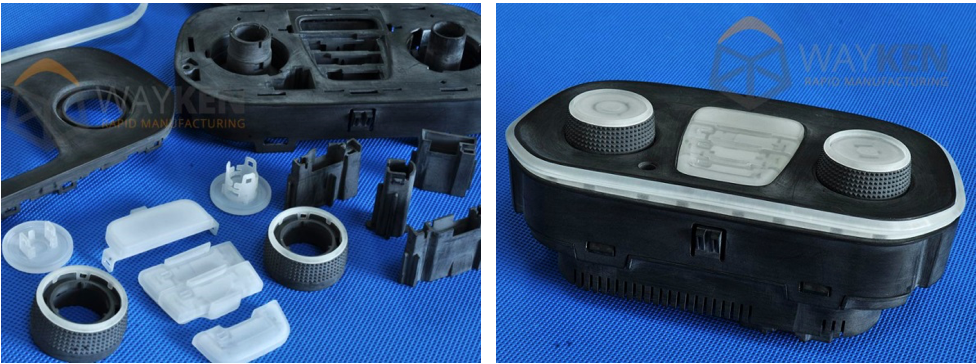Chinese rapid manufacturing company WayKen produces a variety of functional prototypes for its clients using various technologies. WayKen uses CNC Machining and Rapid Tooling Technology to create a range of objects with high-strength thermoplastics. They also apply a variety of finishing techniques like polishing and sanding. They mostly work with industrial clients that require models that are functional with form and fit in mind.
The company is among the most experienced prototyping shops in China. Located in Shenzhen, near Hong Kong, their main goal is to provide affordable, functional prototypes. While they do not discuss prices directly, the company is capable of providing quotes within a few hours. They also highlight how competitive their prices are as compared to their European and US counterparts.
A large part of WayKen’s work is done through CNC machining. CNC allows them to carve out accurate prototypes on request. Company’s send over their 3D designs and WayKen then has its engineers look over the design to see whether or not it is a feasible idea. The company then makes the prototype and applies some form of finishing or polishing to complete its development. They often combine CNC with other methods of material processing such as laser etching or painting.
With the aid of state-of-the-art Computer Numerical Control software and machinery, the company can achieve a turnaround of 3-9 business days. The picture above shows a functional prototype designed for an automotive tech centre. The air conditioning control panel consists of 32 individual pieces that required minute, exact detail. CNC is definitely still one of the fastest methods available considering that it produced that functional 32 piece unit in 10 days. Additionally, WayKen designed it for fit and function. The AC control panel is made of Polycarbonate and Black ABS later polished smooth.
Many firms will waste their time on a prototype that cannot be tested, thus functional designs remove a step in the process. The level of detail and smoothness that their CNC machines provide, allows companies to jump right into testing their products. The CNC machines hold a tolerance of 0.05mm. This makes it ideal for small parts such as those on the control panel.
Intricate knobs and dials require not just a smooth look but very precise movement as well. This is why WayKen produced the parts with 3 – 5 additional bits each. These additional bits like ornament rings and key bodies etc. gave the parts the exact fit they needed. The company believes that one of the advantages of functional prototypes is the ability to move directly to the testing phase.
For clients that require low volume molded parts, WayKen opt for Rapid Injection Molding. This method allows them to produce on cheaper terms as compared to mass production molding. It also has the benefit of producing parts quicker. They offer complete tool-making capabilities and plastic molding modifications. Its biggest benefit is that it combines the look and feel of more than one material for the final product.
The image above shows the work they did for a software company. The client requested that WayKen produce a cover for their GPS devices. Within 30 days the company produced 3000 sets of these, an impressive rate. They also made the entire structure waterproof through the use of a TPE molding on top of the Polycarbonate.
Additionally, the engineers often help flesh out the model so it can have these attributes such as better hardness or water resistance. The engineering team often looks over how to best convert the client’s requests into a workable model. This often requires finding a good combination of materials or reworking the design. In the case above they made the suggestion to add two gates so that the TPE fills out better. This allows them to compensate for the thinness of the material.
At WayKen, their technologies are capable to provide complete tool making and immediate support for plastic molding modifications. This includes prototype injection molding and mass injection molds. The company can process these molds in a variety of materials like cast steel, aluminum, P-20 or high-grade tool steel.
By rapid tooling aluminium tools, you lower the cost of building a mold as opposed to working with hard steel. It can be machined 15%-30% faster, polished 3-10 times faster, and it is lighter in weight. Rapid tooling also provides easier temperature control, allowing faster cycle times and the ability to remove the plastic parts at lower temperatures. This eventually results in less product distortion.
Steel tools are tougher and more durable but can take longer to produce. These are suited for larger volumes or when injecting abrasive or corrosive plastics that would damage aluminum molds. Pre-hardened tool steel is used for quantities of 100,000 and above, depending on the type of plastic and the part geometry. WayKen uses P20 and NAK80 stress-relieved steel. Fully-hardened tool steel is the most durable and can be used for millions of injected parts. H13 hardened steel is ideal for full production volumes or when injecting abrasive engineering-grade plastics.
If you are interested in working with WayKen, you can contact them here.

 亞洲大學3D列印研究中心
亞洲大學3D列印研究中心

